The Right to Life and the Death Penalty in Iran – Conference Series
Written by ACI in 18 September 23Iran has the highest rate of executions per capita, and the numbers are increasing at an alarming rate. In keeping with ACI’s aims and objectives of finding solutions and building a better future for Iran, ACI has undertaken a series of studies and surveys to find out how the death penalty can be abolished in Iran
In view of the increased number of executions in Iran on drugs related charges this year alone, our forthcoming conference will focus of the role and responsibility of the international community:
- How is the international community and the UN agencies resolving the use of the death penalty and lashes as punishments – even for addicts – with United Nations standards and international best practice?
- How is the international community and the UNODC resolving the contradictions between cooperation with the IRGC and the regime with the fact that IRGC is complicit in international organised crime and drugs trafficking?
- How is the international community and the UNODC resolving the increased numbers of arrests, detentions, torture and ill treatment and unfair biased trials for protestors in the last year with UN standards and international best practice?
- What is the role and responsibility of the international community when the State not only fails to protect the safety and security of its people but, poisons, maims, kills and executes its people?
Previous Conferences
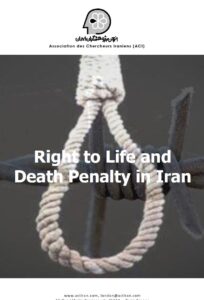
Introduction
Iran has the highest rate of executions per capita, and the numbers are increasing at an alarming rate. In keeping with ACI’s aims and objectives of finding solutions and building a better future for Iran, ACI has undertaken a series of studies and surveys to find out how the death penalty can be abolished in Iran. Key questions to consider include:
- International obligations and Human rights standards vs. national laws;
- Can the death penalty be abolished in view of the present-day religious and ideological laws in Iran;
- Qesas, the law of retribution;
- ‘Serious crimes’ or ‘exceptional circumstances’;
- Alternative punishments for worst offenders;
- Executions as deterrents;
- Victim’s rights vs. community rights;
- Possible execution of innocent persons;
- The use of the death penalty as a tool of intimidation, oppression and control;
- Due process and prison conditions for death row inmates
The recurring question to be examined at all conferences concerns public opinion and the role and responsibility of mass media:
- The role and impact of traditional mass media vs. social media;
- The role of social media in improving community cohesion;
- The policy impact of media reporting and media bias;
- The dynamics between the mass media and special interest groups;
- The issues behind media financing;
- An independent media with a diversity of views;
- The relationship between mass media and power
The Conference Series
To date, one internet survey and three conferences have been undertaken with a further conference proposed in the near future.
All conferences are live streamed and the films of past conferences are available on ACI’s YouTube channel. Presented papers are published in a book available from any of ACI’s offices.
Below is a brief report of past work:
Right to Life and Death Penalty in Iran:
The Regime’s Instability and the Deployment of Violence and Executions
5/6 December 2009 – Cologne, Germany
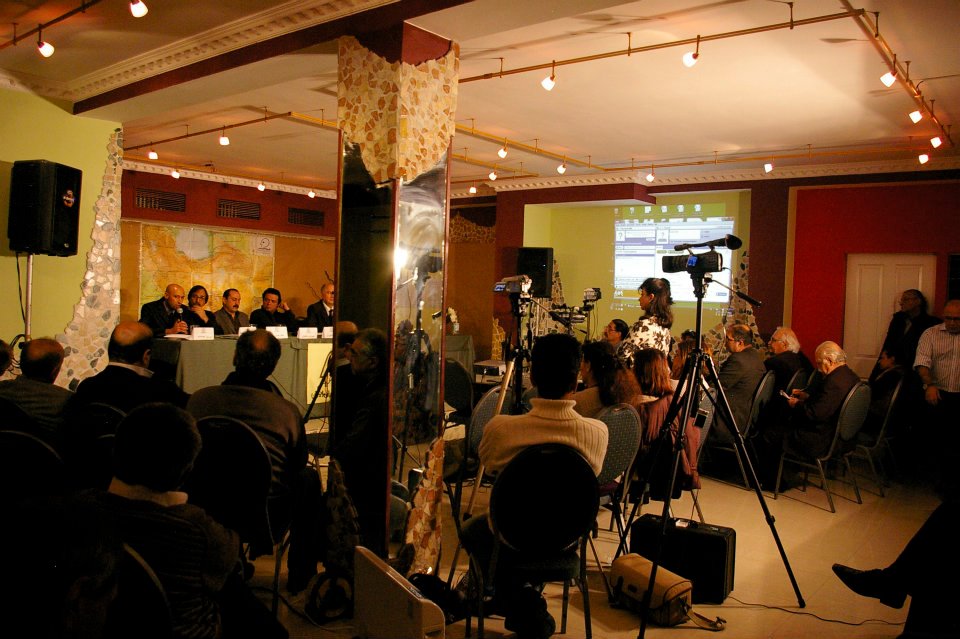
Following the disputed presidential elections in Iran and in view of the widespread deployment of violence, intimidation, rape, imprisonment and the ultimate cruel, inhuman and degrading punishment ‘the death penalty’, ACI organised an emergency conference in Cologne-Germany with the aim of reaching a coordinated and concerted effort in opposing and working towards abolishing the death penalty in Iran, in all cases, regardless of the nature of the crime, the characteristics of the offender, or the method used by the regime to kill the prisoner. The following key issues were examined:
- The sociological aspect of the use of the death penalty
- Human rights: the violation of fundamental rights in Iran
- The use of violence and the death penalty against Iran’s ethnic groups
- The use of violence and the death penalty against Iran’s religious groups
- A realistic assessment of the regime’s instability and the deployment of violence and executions
At the conclusion of the conference, a consensus was reached by all participants comprising Iranian ethnic and religious groups and human rights groups and defenders. The following pledge was signed and others were invited to join leading to a campaign entitled ‘Be our Voice’.
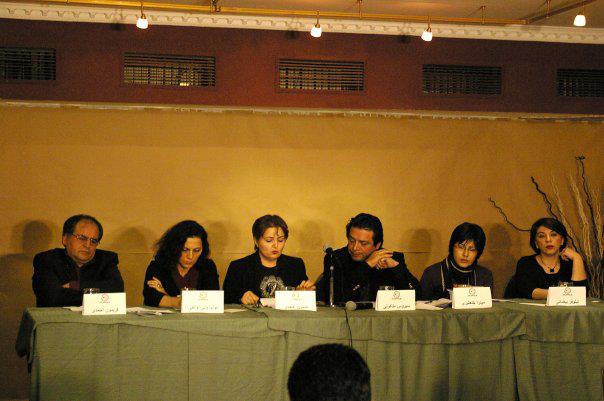
Fereydoun Ahmadi, Tonia Valioghli, Nastaran Amjadi, Sirus Malakooty, Mitra Khalatbari, Niloofar Bayzaie
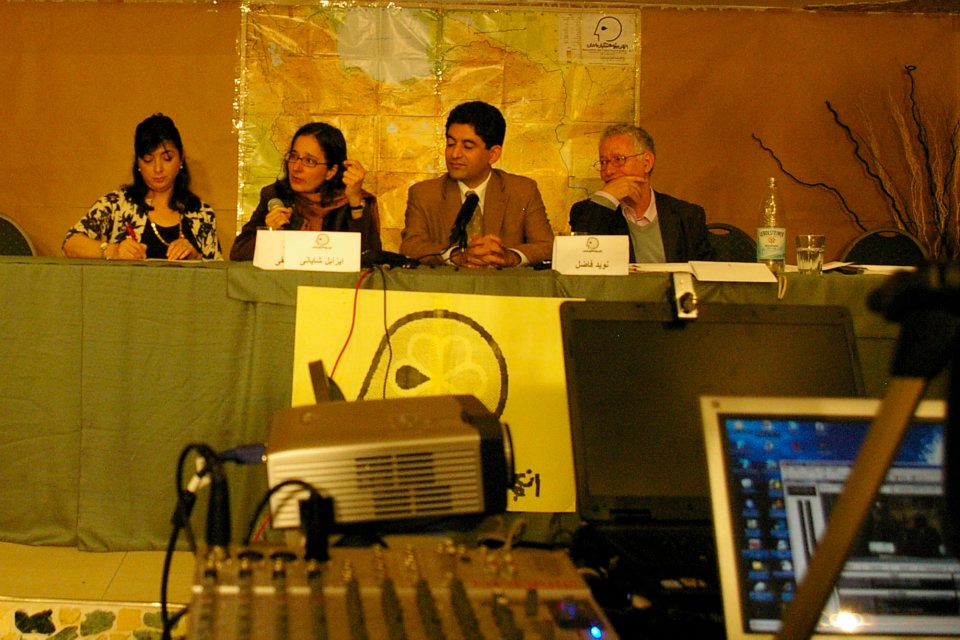
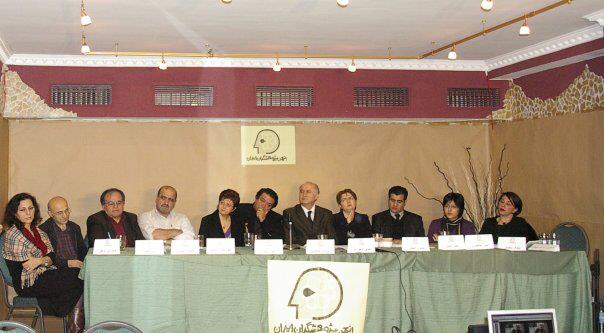
“…We, the undersigned, believe that all Iranians without distinction of any kind, such as race, colour, sex, language, religion, political or other opinions, national or social origin, property, birth or other status are equal and for this reason, we condemn all cases of execution throughout Iran and commit to full and mutual support for each other
We, the undersigned, invite all individuals, groups, organizations, parties and human rights activists and organizations to join us in condemning the use of the ultimate violence, the death penalty, in Iran. With your help, we can employ global networks and opportunities in order to support the persecuted in Iran and end executions that are taking place all over Iran today.
May we be the voice of the voiceless in Iran who are the helpless victims of systematic and escalating state-sponsored violence…”
Right to Life and Death Penalty in Iran (2):
Human Rights and Death Penalty as a tool of oppression
18/19 January 2014 – Cologne, Germany

On day one of this conference the key question of ‘the right to life and the death penalty’ was discussed with regard to overall laws and religious practices in Iran. The consequences and affects of violent laws and public executions on society were among important topics of discussion.
Findings of a dedicated public opinion survey on the “Right to Life and the Death Penalty in Iran” were presented to the conference. Out of the 1111 confirmed and verified responses only 9% of the participants supported the death penalty
The showing of a moving and award-winning documentary about the plight of three minors on death row also took discussions further concerning State perpetuated the cycle of violence when the responsibility of making life or death decisions is passed on to the aggrieved families of victims.
In a taped message from Iran, we heard from activists who work relentlessly on securing pardons for death row prisoners such as the young minors in the documentary and the invaluable role of sportsmen, actors and public figures in these efforts.
Day Two of the conference heard from Iran’s ethnic and religious groups and the use of the death penalty as a tool of oppression. Through a taped phone message, we heard the pleas of a young Sunni Kurd on death row, imprisoned at Rajaie Shahr prison, who bravely told the conference of repeated failures and injustices he had experienced. We also shared the tragic story of a mother whose two young sons were executed in Iran.
At the beginning of the last panel, we received a message of support from campaigners within Iran who welcomed the active cooperation of the Iranian diaspora in upholding the ‘right to life’. This was followed by an examination of the importance and relevance of public opinion on policy decisions and the role of media in reporting executions. We heard from experienced journalists with national and international experiences about the opportunities and obstacles to unbiased objective reporting in Iran. Legal experts discussed the duties of governments, the effects of laws on changing culture and the importance of education in raising public awareness about the right to life and the death penalty.
At the conference’s conclusion, the participants proposed that ACI set up and coordinate a coalition made up of all Iranian abolitionists to pull resources together and work in a cogent, cohesive manner towards this common objective. In accepting this arduous task ACI has invited the cooperation and participation of all interested parties and is at present working on a plan of action.
The interactions with colleagues, activists and human rights defenders in Iran were a most valuable contribution to the proceedings and their input was an asset in the fight against the death penalty in Iran.
Right to Life and Death Penalty in Iran (3):
Social and legal aspects of death penalty in Iran and USA
24/25 May 2014 – Los Angeles, USA
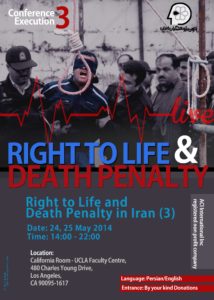
In this third conference, the proceedings heard the valuable contributions of US and international organisations such as the ‘American Civil Liberties Union – ACLU’ and ‘Reprieve’ who offered valuable insight into the application and execution of the death penalty in the USA and the importance of raising awareness through carefully planned campaigns.
As in the previous conferences, this gathering also benefited from the active participation of colleagues in Iran.
The key question for consideration at this conference was the likelihood of abolishing the death penalty in Iran in view of existing religious and ideological laws which were discussed extensively.
The media panel highlighted the importance of unbiased reporting and respect for the families of victims when campaigning for pardons in murder cases. The great value of the complimentary work of reporters and journalists in and out of Iran was also discussed.
Conference concluded with the following recommendations:
- Raising awareness and dialogue with ordinary members of public must be at the top of the agenda of any successful campaign against the death penalty in Iran;
- Safe support for civil society and grass roots activists against the death penalty in Iran;
- Informing and engaging the international community to bear pressure on the Islamic Republic on the issue of death penalty in Iran
Poetry and Lyric Competition
24 May – 1 September 2014
ACI’s third conference in this series also saw the launch of a poetry and lyric competition. Entrants were invited to send in their work by the first of September 2014 for selection and publication in time for 10 October 2014 World Day Against Death Penalty. We are fortunate to have Iraj Janati Ataei, renowned Iranian lyricist and playwright, among the judging panel.
Survey: Death Penalty in Iran
01 December 2013 – 15 January 2014
ACI conducted a 45 day internet survey on the question of the death penalty in Iran. As a sign of sensitivity to the topic the survey site was hacked and fell prey to three separate ‘phishing’ attempts by the Islamic Republic.
This survey, as with all of our other surveys, did not ask for the personal details of the respondents and limited itself to demographic questions. However, the fake survey page asked respondents from Iran to enter their names and email addresses before completing the survey.
Nevertheless, ACI’s technical experts recovered the survey. The respondents were mainly from Iran, Europe, the United States and Canada respectively. Their responses can be categorised and evaluated based on age, gender, education, employment, religion, place of birth, place of residence and other factors included in the demographic section of the survey.
Out of the 1111 respondents, 67% men and 23% women participated. The biggest age group participating in the survey were the 40-59 year olds.
In total, only 9% of the respondents supported some form of execution, the majority of whom supported Qesas (law of retribution). Men supported the use of the death penalty as a punishment twice more than women.
The full analysis is available upon request.
Future Proposed Conferences
Conference 4
Day One:
Mass Media influence on society and public policy
Day 2:
Criminal Justice system and the death penalty
Conference 5
Day One:
International standards, due process and prison conditions in Iran for death row inmates
Treatment of female death row inmates
Day Two:
Mass Media influence on society and public policy
Transitional justice and the death penalty in the future of Iran
ACI maintains an impartial and unprejudiced approach
to all its activities and respects all schools of thought.
We work actively with colleagues from all over the world
and hope to contribute towards a better future for Iran.
We welcome and invite the participation of all interested in Iran’s future.
ACI international Inc registered non-profit organisation exempt under section 501 (c) (3)